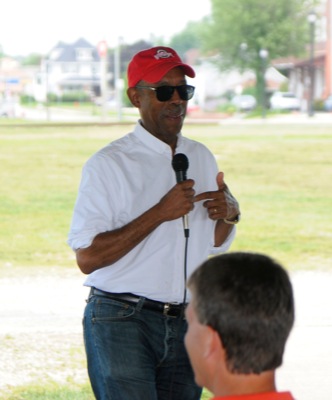Saturday, August 15th, 2015
'Greatest Generation' recalls war efforts
Residents share their memories on 70th anniversary of end of World War II
By Tom Millhouse
MERCER COUNTY - After years of death and destruction never witnessed on such a global scale, World War II finally came to a close 70 years ago today when Japan, reeling from the impact of two atomic bombs, surrendered to the Allies.
The surrender came several months after Germany gave up its quest to conquer the world.
Millions of service members and far more civilians around the world died during the conflict. The war's impact was felt across the United States; dozens of men in Mercer and Auglaize counties and surrounding areas made the ultimate sacrifice to preserve the country's freedom.
With World War II veterans now reaching their late 80s and older, each year fewer of "The Greatest Generation," as journalist Tom Brokaw called them, are left to tell the story of the fight to preserve democracy on the battlefield and the home front.
"Their generation was a very interesting generation," Mercer County Veterans Service Officer Tom Risch said. "They made it through the Depression and the war followed very closely after that."
World War II veterans were a humble bunch, he said.
"They went over there and fought for the duration and when the war was over, they came back home and went to work," Risch said. "They had very little to say."
But their accomplishments spoke volumes.
"Let's face it, we're not speaking German or Japanese now and we live in a democracy," Risch said. "That was a huge impact they made on the world."
Several local World War II veterans shared with the newspaper a glimpse of what they endured and experienced while serving overseas.
Charlie Spriggs
After surviving the Battle of the Bulge and the Arctic-like German winter earlier in the war, the last thing Celina native Charlie Spriggs, 90, and his Army buddies wanted to do after the war in Europe was to ship out to fight thousands of miles away in what was expected to be a bloody invasion of Japan.
That's exactly what thousands of GIs were facing in the early summer of 1945. After Germany surrendered on V-E Day, May 7, 1945, the Allies' attention turned to ending the war in the Pacific.
"We came back (to the United States) right away, we got rid of our vehicles," said Spriggs, who drove a half-track, heavy vehicle mounted with a large machine gun covered by an armored turret. "We came back here and they issued us new equipment. We didn't have any orders, but we were getting ready."
The orders never came, he said.
"The atomic bomb took care of that," Spriggs said, referring to the nuclear bombs dropped on Hiroshima and Nagasaki that led to the Japanese surrender.
"You bet we were happy," Spriggs added.
Although the war was over, Spriggs' service in the Army didn't end until several months later. His discharge was official on Dec. 6, 1945 - one day before the fourth anniversary of the Japanese attack on Pearl Harbor, which brought the U.S. into the war.
Spriggs couldn't recall where he was when he learned of the Japanese attack but figured he would be called into service.
"I went right out of high school," he said. "I had my draft papers before I had my graduation papers."
When he arrived for basic training at Fort Knox, Ky., he saw a sign in a window for heavy vehicle operators and decided it sounded interesting.
"We had all types of vehicles, not just tanks," Spriggs said.
With the war heating up and an invasion of Europe planned, Spriggs soon arrived in England and was shipped out a short time later.
"Time was moving fast," he said. "I went in D-Day plus three," referring to his arrival three days after the invasion of Normandy. "They had pushed them (Germans) back by the time we got there."
It didn't take long for Spriggs to be introduced to the war.
"I was sent in as a replacement," he said, explaining he assumed the role of the driver of a half-track vehicle after the previous driver was injured by shrapnel during an artillery barrage.
"The first day I was there, there were shells landing nearby," he said, recalling how he and others in his vehicle scrambled for cover. "I didn't have a foxhole, so we went into a low area along a fence row."
He wasn't sure what would happen next, he said.
"I didn't know what to expect, I was just trying to stay alive," he said.
Although there were other close calls, the Third Army under the direction of Gen. George Patton continued to move forward as the German army was forced to give up ground.
The Allies' advance was halted in December 1945 by a last-ditch German counter-offensive in what would become known as the Battle of the Bulge.
"Oh, it was cold, it was 20-below and there was a foot and a half of snow," he recalled.
Spriggs said he and four other soldiers took shelter in a hole for several days.
They covered it with a piece of plywood and tried to stay warm.
"We lived on C-rations and K-rations," he said. "They (soldiers in trucks) came around and threw them on the ground."
A few months later, the Germany offensive was turned back and the war in Europe ended.
Spriggs said he was lucky enough to escape injury but he lost friends in the war, including Lee Meyer of Celina who was killed while serving in the Navy.
John Cron
Although Celina resident John Cron, 93, lost much of the sight in one eye after a childhood illness, he was determined not to let the impairment keep him from serving his country when World War II erupted.
"This was history being made and I wasn't going to be left out," he said, recalling he was at the old bowling alley in Celina with his father when the news broke about the attack on Pearl Harbor.
Carving out his role in the war didn't come easily as he repeatedly was turned down when he tried to enlist.
"I tried the Marines first because they had the best-looking uniforms," he said with a laugh. "A friend of mine was accepted and I wasn't, so I thought I would try the Army next."
After several attempts he was accepted by the Army but only for limited service. Much to his chagrin, Cron was dispatched to West Virginia to serve as a recruiter.
"I never recruited a soul," he said. "I had been in the Army for a year and had never taken basic training."
That soon changed. He was sent to Fort Abilene, Texas, where he completed basic training, even passing the firearms test by shooting left-handed with the use of his good eye.
He was later assigned to a hospital unit as a clerk.
"Typing came natural to me. I played the clarinet at IC high school so I could move my fingers," he said.
He was shipped overseas where he served as a clerk in a hospital unit that cared for soldiers wounded in the war against Germany,
"I was 35 miles from the Battle of the Bulge and I saw a lot of the wounded coming back from the battle," he said.
After the Germans surrendered, plans were made for Cron's hospital unit to make its way to the South Pacific in anticipation of the invasion of Japan.
"The A-bomb took care of that," he said.
Hank Lefeld
There is an old adage in the Army that volunteering isn't a wise thing to do. It's advice that Hank Lefeld is glad he didn't follow because volunteering to help on a project led to a post-war career for the St. Henry resident.
Lefeld, 88, left the farm for the Army in April 1945. After completing basic training, he soon was headed to the Pacific Theater as a member of a field artillery unit.
At the time, the Allies had forced the Japanese to retreat after a series of furious battles along a string of Pacific islands. Soldiers feared the most dangerous island battle was about to take place with the expected invasion of Japan.
Lefeld and thousands of others were spared that struggle when Japan surrendered after atomic bombs were dropped on Hiroshima and Nagasaki.
The soldiers in Lefeld's unit hadn't heard of an atomic bomb but they were relieved the new weapon had ended the war.
"The infantry went in first," Lefeld said. "I don't think there would have been many of us left."
After the surrender, Lefeld's unit was part of the occupying force in Japan. He had an opportunity to see the atomic bomb's impact when he visited Nagasaki.
"We saw large metal buildings that were melted on an angle," he said.
Lefeld said the radiation that remained at the site may have been the cause of his post-war illness.
"They thought I wasn't going to make it," he recalled.
While stationed in Japan, Lefeld was approached about helping with a project.
"They asked me if I was interested in helping with a special detail to make showers for the GIs," he said. "That's how I learned my trade."
He later founded Lefeld Plumbing and Heating, which remains a family business.
Lester Huelskamp
Like many families across the U.S., the Huelskamps of the St. Joe area had several children serving in the military. Lester Huelskamp, 92, served with his three brothers, Linus, Leroy and Don.
Lester Huelskamp was drafted off the family farm into the Navy in May 1944. After completing basic training at Naval Station Great Lakes near Chicago, he was among thousands of sailors serving on a brand-new aircraft carrier, the USS Lake Champlain.
Huelskamp was a radar operator, monitoring the skies from equipment below deck.
"We were 30 feet below the water," he said.
He recalled the carrier went for a shakedown cruise to prepare the crew for combat.
"We were headed for the Pacific," he said.
The plans changed. The ship was on its way to the Panama Canal en route to the Pacific when the war ended.
"When we heard that we were all happy," he said. "It really (had) worried us."
They welcomed the detour, he said.
"We made a goodwill tour," Huelskamp said, noting that the ship sailed to Europe before being mothballed.
The USS Lake Champlain later served in the Korean and Vietnam wars.
Loyd Brown
France, Pacific islands and North Africa are familiar assignments to many U.S. veterans who helped preserve the nation's freedom. Others are not so familiar.
Loyd Brown, 90, of Coldwater, spent a year in the sun-scorched nation of Iraq during the war. A native of Logansport, Ind., he was a member of the Army Signal Corps. His unit was assigned to Iraq to provide radio service for the steady procession of planes flying over the Mideast on their way to deliver supplies to India and China.
Brown was drafted after high school and entered the service in 1943.
"A lot of boys in my class went right out of high school," he said.
Having developed an interest in electricity at a young age, Brown used his skills in the field while in the Army. After completing basic training, he attended several specialized schools, including one at Ohio University.
After completing training, Brown found himself on a plane to "the middle of the desert," about 50 miles from Baghdad. His unit was responsible for installing a radio system to provide air-to-ground communication for the planes transporting war supplies.
He recalled that members of the Signal Corps were treated very well. Brown, who later served with his wife, Marie, as missionaries in Africa, said a memorable sidenote was an opportunity to visit the Holy Land while on leave.
Like thousands of other veterans, Brown took advantage of the GI bill, gaining an engineering degree from Purdue University.

